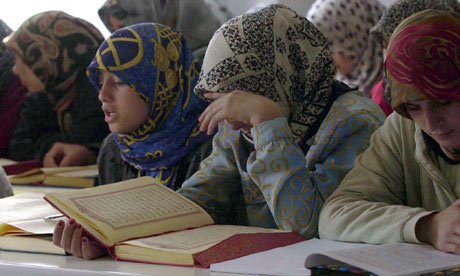The introduction of electronic handcuffs for abusive husbands reflects a growing Turkish movement against honour killings
By Elif Shafak

Women in Batman, southeast Turkey, at Sevket Basak mosque in 2000. Their religious course included the instruction that suicide was a sin. Photograph: Burhan Ozbilici/ Associated Press
Being a woman in Turkey means living with several contradictions. On the one hand, Turkish women were granted the right to vote as early as 1934, ahead of numerous European nations, and they have been far better off than their sisters throughout the Muslim world. Western visitors to Turkey today frequently express their surprise at seeing women highly active and vocal in all cultural, economic and social spheres. Yet on the other hand, there is a darker side to the story that only now is being openly discussed, openly contested: domestic violence.
Ceylan Sosyal was 19 and a mother of a baby girl. In Turkish, her name means gazelle. She was hunted down by her closest kin. Her unforgivable sin was to marry without her parents' approval. After her husband abandoned her, having no other place to go, she returned to her father's house, only to be killed by her brother while the rest of the family waited in the living room. Her father walked into the room several times to check why the murder was taking so long.
In Turkey, the case was a turning point. Rather than arresting the one who pulled the trigger, as has been the procedure until now, the police have taken into custody all six members of the family. This could constitute an example for future incidents, since families will have to think twice about using their younger, often underage sons as pawns in organised murder.
Not all women who are punished in the name of honour get killed, of course. Others are encouraged to commit suicide. Particularly in the province of Batman in the less developed southeastern part of the country, female suicide rates are unusually high. The most frequent method by which they take their life is hanging. Many of these cases are "honour suicides" where women are pressured to take their own lives so as to spare their brothers, fathers or uncles from prison.
Are violent incidents against women on the rise in Turkey? Or is it just that we are finally getting a clearer picture of something that has been happening at the heart of Turkish society for some time? The justice ministry recently announced that there had been a 1,400% increase in the number of reported cases of violence against women.
In recent months, both print and visual media in Turkey have been running story after story about domestic violence: ex-husbands who shoot their ex-wives in front of their children, abusive husbands who come back to kill, boyfriends or fiancés who cannot forgive being dumped and seek revenge.
Every day there is a new incident, and each is more appalling than the one before. A young woman was left bleeding at a bus stop in Konya after being severely beaten by her boyfriend. The face of Ayşe Paşalı, with bruises and scars all over her face, has become a symbol. She was killed by her ex-husband on the street even though she had repeatedly asked for state protection. Another 19-year-old, Hatice Firat, was murdered by her beloved brother after she dared to run away with her boyfriend. When the male relatives in her family failed to show up at her funeral, women shouldered her coffin. "Men killed her," they said, "and we didn't allow men to bury her."
As disheartening as the situation is, there is also a growing reaction and a grassroots movement to stop it. Nowadays it is widely acknowledged that violence against women is not only confined to a few uneducated families in remote undeveloped regions. More importantly, until today, it was mainly assumed that such cases were a "family affair". If a husband was beating his wife, this was their problem. Now this assumption is fully debunked. More and more public figures are coming out to say that domestic violence is everyone's business and we should, as a society, interfere.
Family and social policies minister Fatma Sahin has announced that abusive husbands will be kept away from their homes with the help of electronic handcuffs. A group of men in the eastern province of Van have organised a significant march to protest at male violence. The group's speaker proclaimed: "We are ashamed of men who attack women and do so in the name of manhood."
University students are marching on the streets, women's organisations are collecting signatures. Through blogs, websites, magazines, fanzines, panels and conferences activists are raising their voices, singers give concerts to honour women who have been victims of killings, writers and poets condemn the violence openly and contest it with their words. And yet, all this is not enough. Unless we change the way we raise our sons and discard our belief that they are superior to our daughters, unless we mothers stop treating our sons as the sultans in the house, nothing will be enough.
-This commentary was published in The Guardian on 23/08/2011- Elif Shafak is an award-winning novelist. She was born in Strasbourg in 1971 and is the author of 10 books, including the Bastard of Istanbul and the Forty Rules of Love. She writes in both English and Turkish, and divides her time between London and Istanbul
No comments:
Post a Comment